Contributing € 10
Acknowledgement in social networks
We will mention your name and thank you for your support in the BioReconstruye social networks.
> 24 Backers
We use own and third party cookies to improve your user experience and our services, analyzing users' browsing in our website. If you continue browsing, we will consider that you consent to its use. You can get further information in our Cookies Policy
Modelo de resiliencia comunitaria: territorio, memoria y género
 Min.
Min.
 Opt.
Opt.
We will mention your name and thank you for your support in the BioReconstruye social networks.
We will send you a digital photo of the project with thanks for your support.
We will mention your name and thank you for your support in the BioReconstruye social networks.
We will mention you in a video of the project that will be uploaded to the BioReconstruye social networks.
We will mention your name and thank you for your support in the BioReconstruye social networks.
We will send you a postcard of the project with personalized thanks from the people benefited in the communities.
We will mention your name and thank you for your support in the BioReconstruye social networks.
We will send you a drawing dedicated to you by the children of the community.
We will mention your name and thank you for your support in the BioReconstruye social networks.
You can participate in a fieldwork trip with the organization. We will leave from San Cristobal de Las Casas and stay in the communities for 4 days. You will have the possibility to participate actively and learn natural techniques and about the rehabilitation of houses. You will have transportation (from San Cristobal), accommodation and food paid.
We will mention your name and thank you for your support in the BioReconstruye social networks.
We will send you a cloth bag with the logo of "Women working with land".
We will mention your name and thank you for your support in the BioReconstruye social networks.
We will send you a T-shirt with the logo of "Women working with land".
We will mention your name and thank you for your support in the BioReconstruye social networks.
We will send you a printed manual of basic natural biocontruction techniques.
We will mention your name and thank you for your support in the BioReconstruye social networks.
You will be a sponsor of the project and you will appear in:
Earth and Memory
 Task
Task
|
Minimum | Optimum |
|---|---|---|
|
Administration
Billing, meetings, financial and technical reports, accounting (for one house)
|
€ 450 | |
|
Field Technical Coordination
Organization of the trips to the community, coordination of volunteers, technical monitoring of rehabilitation (for one house)
|
€ 450 | |
|
Education
Planning, implementation and evaluation of workshops (for one house)
|
€ 450 | |
|
Communication
Lifting, selection and editing of audiovisual material. Social media management (for one house)
|
€ 450 | |
|
Evaluation and Follow-up
Technical accompaniment of the building processes (for one house)
|
€ 450 | |
|
Labor fees
Master of work and operators (for one house)
|
€ 200 | |
|
Meetings and conferences
Team meetings, planning, design, chronogram, challenge scan and problem solving. Budgets and purchases (for one house)
|
€ 1.150 | |
|
Administration
Billing, meetings, financial and technical reports, accounting (for two houses)
|
€ 900 | |
|
Field Technical Coordination
Organization of the trips to the community, coordination of volunteers, technical monitoring of rehabilitation (for two houses)
|
€ 900 | |
|
Education
Planning, implementation and evaluation of workshops (for two houses)
|
€ 900 | |
|
Communication
Lifting, selection and editing of audiovisual material. Social media management (for two houses)
|
€ 900 | |
|
Evaluation and Follow-up
Technical accompaniment of the building processes (for two houses)
|
€ 900 | |
|
Labor fees
Master of work and operators (for two houses)
|
€ 400 | |
|
Meetings and conferences
Team meetings, planning, design, chronogram, challenge scan and problem solving. Budgets and purchases (for two houses)
|
€ 2.300 |
 Material
Material
|
Minimum | Optimum |
|---|---|---|
|
Building materials
Wood, cement, screws, electro-welded mesh, etc (for one house)
|
€ 3.760 | |
|
Transportation: Gasoline
Gasoline for community travel (for one house)
|
€ 350 | |
|
Food
Food expenses (for one house)
|
€ 160 | |
|
Construction tools
Spoons, hammers, pliers, meters, level, lead, etc. (for one house)
|
€ 70 | |
|
Stationery
Prints of manuals, foils, etc. (for one house)
|
€ 60 | |
|
Building materials
Wood, cement, screws, electro-welded mesh, etc. (for two houses)
|
€ 7.520 | |
|
Transportation: Gasoline
Gasoline for community travel (for two houses)
|
€ 700 | |
|
Food
Food expenses (for two houses)
|
€ 320 | |
|
Construction tools
Spoons, hammers, pliers, meters, level, lead, etc. (for two houses)
|
€ 140 | |
|
Stationery
Prints of manuals, foils, etc. (for two houses)
|
€ 120 | |
| Total | € 8.000 | € 24.000 |
The project MODEL OF COMMUNITY RESILIENCE: TERRITORY, MEMORY AND GENDER consists on strengthening and providing adequate accompaniment to communities in risk areas affected by the 2017 earthquake, giving continuity to the process that we have been developing since the stages of emergency, rehabilitation and reconstruction. The link generated with the community has allowed us to better understand their needs. We believe it is necessary to continue working in the community of Nueva Urbina, in the municipality of Pijijiapan. Currently, this process would be aimed at prevention, within the framework of comprehensive risk management, for the prevention of socio-natural disasters. At this stage, we propose the following line of work, based on community participatory strategies:
Project Features:
In the bio-reconstruction and rehabilitation of damaged adobe housing there is a political and moral stance where health, nature, social and cultural life benefit. In addition, it promotes communities' constructive autonomy . It is essential for the preservation of peasant cultural identity that architectural heritage includes rural vernacular forms, instead of focusing the attention on urban environments, such as the historical centres which tell colonial, exploitative and extraction-based history only.
Two years after the events, affected communities are used to live in their damaged houses, which has evidently increased their vulnerability to potential future disasters.
The BioReconstruye Collective proposes participatory methodologies because the greater the community participates in a project, the better the process will be adapted to the social and cultural context, and therefore, the greater the likelihood of achieving long-term sustainability.
The project has 3 main focuses: gender, basin and community.
During the realization of the project, community workshops will also be held, which ensure that the knowledge acquired will not only stay within the circle of families benefiting from the reconstruction of adobe housing but will reach more people. Being a participatory processes, people will acquire a living experience and with it, adapt what they have learned to the needs of other adobe houses damaged by the earthquake or deteriorated by abandonment inside and outside their communities.
General Objective:
Preserve the architectural cultural heritage of 3 damaged rural adobe vernacular houses in the community of Nueva Urbina, Chiapas.
Specific Objectives:
Recover the historical memory of the generations that inhabit the 3 adobe houses.
Strengthen the intergenerational affective bonds of families.
Increase women's participation in both decision-making and house rehabilitation efforts.
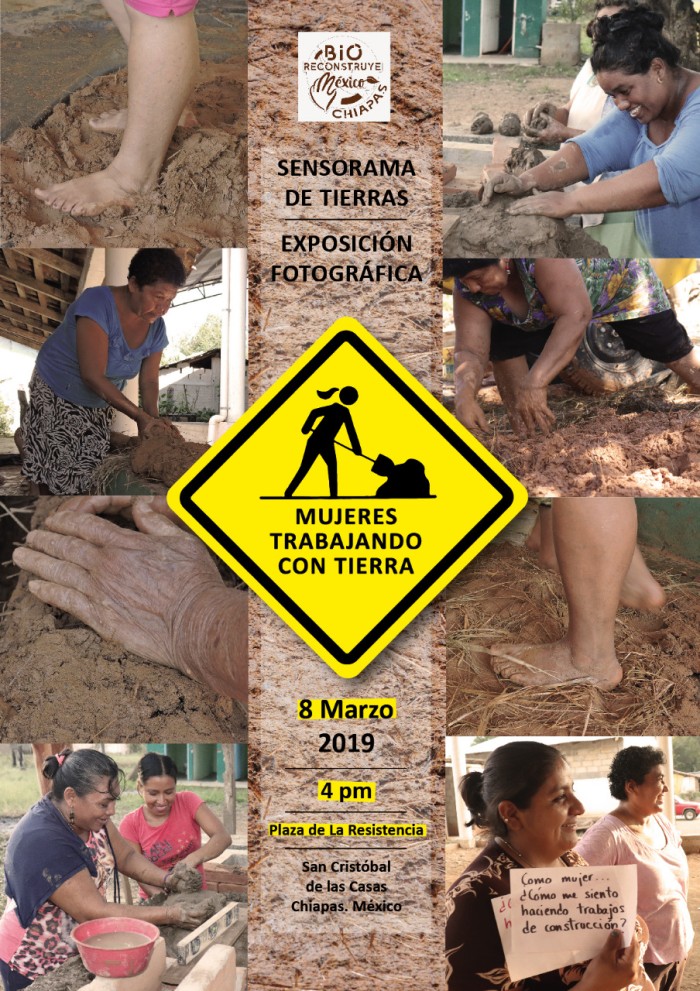
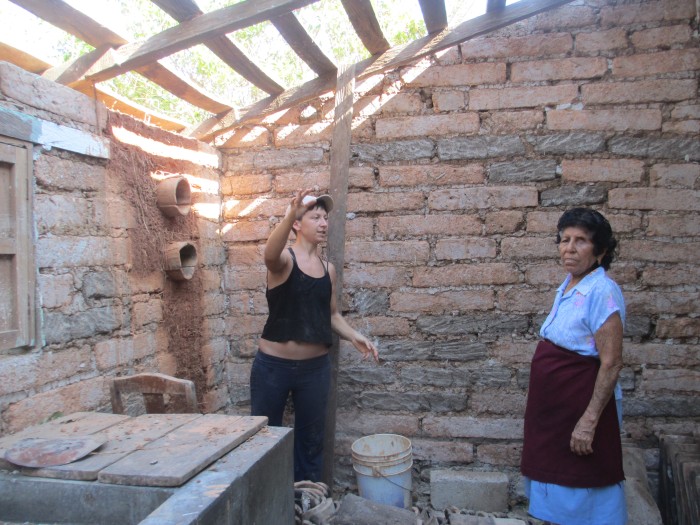
After the 2017 earthquake, a network of spontaneous responses is generated by individuals and collectives in the six affected states, including the BioReconstruye Mexico Network. Specifically, in the state of Chiapas, BioReconstruye México Chiapas performs the emergency work.
The disaster cycle includes the stage before, during, and after the disaster, which merges again with the stage before, during and after the next disaster. And so on, since geophysical phenomena (earthquakes, tsunamis, volcanic eruptions) and hydrometeorological (hurricanes, heavy rains) are not going to stop happening. After the return to daily life, the work to reduce vulnerability, identifying existing risks and prevent future risks becomes indispensable. In this way, we will be building a culture of resilience, understood as the ability of individuals and a community to respond and adapt; that is, the ability to leverage experience to project the future. In this way, we will not start from scratch in the face of a new disaster situation and will reduce the risk over time.
We will run the project in the community of Nueva Urbina, Pijijiapan, Chiapas, (Mexico) and we will carry out our work considering women as fundamental agents in community management capacity, since their organizational experience to sustain life is critical in reacting and preventing a disaster. This women's organization, responsible for reproduction, resource management and care, remains unseen, so it is essential that it moves from the periphery to a central role in decision-making.
Similarly, this invisible organization is based on community ties and is this social fabric one of the most important protective factors that will ensure the reduction of risk. This community perspective provides us with the participatory tools to generate an exchange between the collective and the community, in an exercise of autonomy.
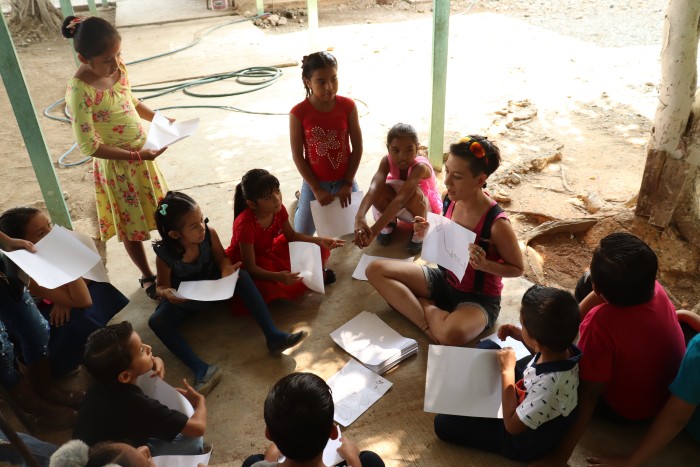
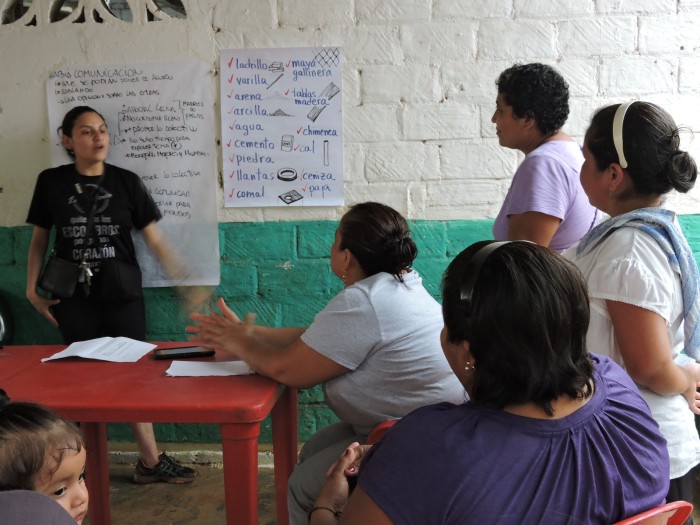
Currently, we are a transdisciplinary team of four women working with natural construction, appropriate technologies and agroecology, through horizontal practices.
We carried out our work in communities in the state of Chiapas (Tonalá, Pijijiapan and San Cristóbal de Las Casas), which were affected by the earthquake of september 7, 2017. The following work was carried out:
Members of the collective :
Architect Fernanda Prado Flores
Architect specialized in natural construction, with extensive experience in construction management. Responsible for the administration and management of resources, realization of budgets and systematization of information.
Architect Mariana Decorme Bouchez
Architect specialized in natural construction, permaculture and appropriate technologies. Since the 2017 earthquake, she has been collaborating with affected communities in the reconstruction and rehabilitation of their houses. Responsible for overseeing and accompanying the construction processes.
Educational Psychologist Martina Vega Francino
Responsible for developing pedagogical proposals and learning environments with participatory and collaborative methodologies with a gender focus. Responsible for the evaluation of learning processes.
Geologist Virginia Domingo Fernandez
Specialized in strategies for the prevention of socio-natural risks and disasters with a basin and gender approach, as well as in the design and installation of hydraulic systems. Responsible for external communication and systematization of audiovisual material.
Resources:
Basic tools are available for construction, communication and water analysis. A car is also available.

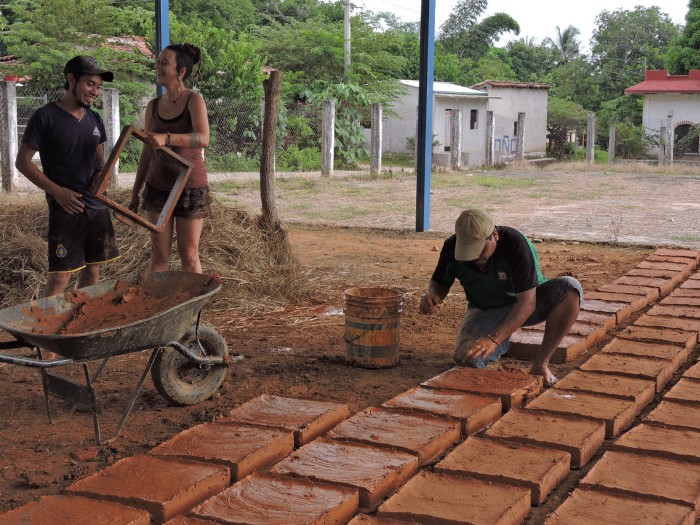

The Social Commitment consists in strengthening and providing adequate accompaniment to communities in risk areas affected by the 2017 earthquake, continuing the process we have been developing from the stages of emergency, rehabilitation and reconstruction.
The preservation of the architectural cultural heritage through the rehabilitation of 3 adobe houses, will allow us to reduce the risk of collapse and the usual accidents and loss of life.
Thanks to the gender perspective, we see women as key players in community management capacity, as their organizational experience in sustaining life is critical in reacting and preventing a disaster.
Construction has been for a long time and in many places in the world exclusive to men, so the appropriation of this knowledge will allow women to have greater participation in decision-making.
Thanks to the basin approach, we understand that the recognition of the dynamics of the territory in which we live allow us to develop capabilities that can reduce community vulnerability and increase resilience in the face of socio-natural disasters that can happen, fostering a harmonious relationship with nature in which we understand what our role in caring for and defending life is.
Acknowledgement in social networks
We will mention your name and thank you for your support in the BioReconstruye social networks.
> 24 Backers
Digital photo + Acknowledgement in social networks
We will send you a digital photo of the project with thanks for your support.
We will mention your name and thank you for your support in the BioReconstruye social networks.
> 19 Backers
Acknowledgement in video + Acknowledgement in social networks
We will mention you in a video of the project that will be uploaded to the BioReconstruye social networks.
We will mention your name and thank you for your support in the BioReconstruye social networks.
> 10 Backers
Printed postcard + Acknowledgement in social networks
We will send you a postcard of the project with personalized thanks from the people benefited in the communities.
We will mention your name and thank you for your support in the BioReconstruye social networks.
> 07 Backers
Original drawing from the children + Acknowledgement in social networks
We will send you a drawing dedicated to you by the children of the community.
We will mention your name and thank you for your support in the BioReconstruye social networks.
> 04 Backers
Participation in a fieldwork trip + Acknowledgement in social networks
You can participate in a fieldwork trip with the organization. We will leave from San Cristobal de Las Casas and stay in the communities for 4 days. You will have the possibility to participate actively and learn natural techniques and about the rehabilitation of houses. You will have transportation (from San Cristobal), accommodation and food paid.
We will mention your name and thank you for your support in the BioReconstruye social networks.
> 03 Backers
BioRecontruye bag + Acknowledgement in social networks
We will send you a cloth bag with the logo of "Women working with land".
We will mention your name and thank you for your support in the BioReconstruye social networks.
> 10 Backers
BioReconstruye T-shirt + Acknowledgement in social networks
We will send you a T-shirt with the logo of "Women working with land".
We will mention your name and thank you for your support in the BioReconstruye social networks.
> 05 Backers
Methodological manual of biocontruction + Acknowledgement in social networks
We will send you a printed manual of basic natural biocontruction techniques.
We will mention your name and thank you for your support in the BioReconstruye social networks.
> 00 Backers
Project Sponsorship + Acknowledgement in social networks
You will be a sponsor of the project and you will appear in:
> 01 Backers